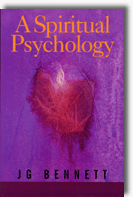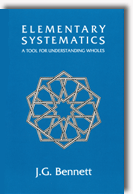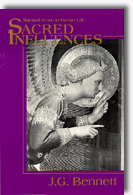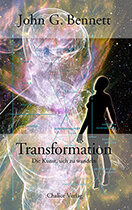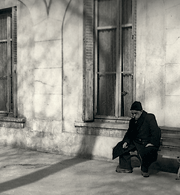Description
Paperback • 152 pages • New Material Added • rare | Click to see eBooks!
New Edition! New Foreword by Anthony Blake, author of The Intelligent Enneagram.
When Bennett first read All and Everything: Beelzebub’s Tales to His Grandson in 1948, he was convinced that it would have a powerful impact on all who came across it. He regarded it as a work of superhuman genius, containing expressions of reality which, by their very nature, were bound to make severe demands on any reader. With Gurdjieff’s approval, he undertook a series of lectures in London, between 1949 and 1974, focusing on the essential meaning of Beelzebub’s Tales. Those talks have been collected here.
More than commentaries, these “talks” are an invitation into the deeper meanings of Gurdjieff’s enigmatic “tales” to his grandson.
Given during the last year of Gurdjieff’s life and into the 1950s, this collection of talks by JG Bennett was compiled and arranged soon after the last years of Bennett’s life by his student and close associate, Anthony Blake. Now, thirty-years after that initial compilation, Blake, an accomplished author and acknowledged philosopher, gives us, in his compelling new foreword, many remarkable and contemporary insights into the visionary message of Gurdjieff’s three series of writings, All and Everything, for which Beelzebub’s Tales is the first.
Although Bennett’s talks – given with the approval and encouragement of Gurdjieff – were intended by Bennett to be a companion to reading and understanding Gurdjieff’s masterwork, Anthony Blake’s timely new foreword allows even those unfamiliar with Gurdjieff’s Tales to begin a journey into the depth of its meaning.
“[A strong] contradiction in Gurdjieff’s writings is that, while claiming contemporary humans are almost entirely mechanical and living in illusion, he also claimed that his writings of themselves could destroy their illusions. This is at face value absurd. But, this kind of absurdity is one of the main themes of [Beelzebub’s Tales]. Just as he once claimed that two hundred conscious men and women could prevent war on earth, so it might be that we need to understand a deep and far-reaching principle, that conscious influences could change things in a way that is qualitative rather than quantitative. Bennett says some interesting things in his talks about this, when he argues for the power of ideas.
“The value may be that the whole thing is an apparatus for transmitting a signal, a signal that summons those able to respond and shows them how to wake up and assume their true destiny.”
Anthony Blake, from his new foreword in Bennett Books new edition of JG Bennett’s Talks on Beelzebub’s Tales.
J.G. Bennett=Author
Review by Pierce Butler
DESCRIPTION: This is a collection of JG Bennett’s writings about All and Everything (Beelzebub’s Tales to His Grandson) dating from two different periods of his life: from 1950 at Coombe Springs when the memory of working intensely with Mr. Gurdjieff was still fresh; and from 1974 when he was engaged in another experiment in communal work at Sherbourne House.
Tony Blake’s introduction points out the essentially modern form of All and Everything, locates it among the works of modernist writers like Joyce and Beckett, and establishes connections with remote sources like the Mathnawi of Jelalludin Rumi. Bennett’s approach to the book is based on Gurdjieff’s conception of understanding, a process that involves feeling and sensing as well as thinking. The complexity of All and Everything is intended to activate in the reader a certain kind of inner effort, and Bennetts’s writings are invaluable for their recognition of what is required in order to engage with this complexity. Although the editor believes that All and Everything is a “mythological text” that baffles traditional exegesis, his organization of Mr. Bennett’s writings under 4 main subheadings (History, Cosmology, Cosmogony, and Work) corresponds roughly to the traditional stages of biblical exegesis: historical, allegorical, anagogical, and moral.
Bennett begins by clarifying a central theme or imperative that animates the book: the awakening of human beings to the sense and meaning of the own existence and the acceptance of the necessity for conscious labor and intentional suffering as an integral part of a responsible life.
The writings on “History” deal with the approach required by the difficulties of All and Everything and with Gurdjieff’s intention in writing it. Reflections on Gurdjieff’s representation of human history lead to a discussion of the lessons about the historical process that his book contains. In “Cosmology,” Bennett outlines Gurdjieff’s conception of creation and the fundamental cosmic processes that underlie evolution. “Cosmogony” deals with creation in more detail, describing the fundamental cosmic laws and the changes in their functioning that lead to a cosmos dependent on reciprocal maintenance – and to the possibilities of self-perfecting for three-brained beings. Part of Gurdjieff’s intention is to impress upon the reader that we live in a world pervaded by uncertainty and that uncertainty – and the intelligence it calls into play – is the necessary condition of personal transformation.
The writings on “Work” discuss the rationale and the methods of the inner work presented in Beelzebub. Of particular interest is the concept of djartkolm – waking up – which can be brought about artificially through external means or as a result of one’s own intentional efforts. In the essay on Being-Partk-Dolg-Duty (which is virtually identical to a talk recorded by Bennett under the title “Conscious Labor & Intentional Suffering”), he returns to one of the central ideas of All and Everything; service to future humanity by work on oneself in the present.
QUOTATIONS:
–“Gurdjieff’s elaborate symbolism, uncouth neologisms, and changes of terminology were not adopted to mislead and distract his followers, but to ensure that they would make the effort to discover the meanings for themselves.”
–“To change myself is a practical objective; to change the world is not merely an unrealizable ideal, it is a violation of universal laws.”
–“Nothing can be done by outward force – everything can be done by inner strength.”
–“The spiritual world begins from the whole, whereas the material world begins from the part.”
–“Life…has the peculiar power of bridging the gulf between the separate atomic world of physical phenomena and the universal world beyond individuation…life is the bridge and we are part of life.”
–“The price for something new to come into the world is uncertainty, danger, and insecurity.”
–“Evil is…not something fighting against good, but that which has to be rejected in order to allow the good to fulfill itself.”
–“If we use our creative power for ourselves, it destroys us. If we sacrifice ourselves in order to serve the creative power, then it creates us.”
–“Any view of human existence that denies or weakens the reality of the choice between life and death defrauds man of the very knowledge that can set him free.”
–“Air can be for us a representation of the limitless compassion by which everything is supported. In reality, air is that compassion; it has the qualities we ascribe to it not by virtue of our thinking but in a way far more concrete than we can imagine.”
–“Conscious labors must always come under the requirement of acting without regard to the fruits of action…it is only when we do what has to be done simply because it has to be done that work can liberate us from our own egoism.”
–“Our minds cannot grasp that we can be, at one and the same time, unique individuals with unique individual wills and also be sharers in the collective will of human society or life and even the will of the source of everything existing, the will of God.”
TABLE OF CONTENTS:
Part One: The Arousing of Thought
Prologue: remembering Mr. Gurdjieff as a teacher in Paris
A Study: use of symbol, myth, and verbal formulae; outline of humans’ place in the universe and the opportunity offered by the acceptance of responsibility.
Part Two: History
Glimpses of the Truth: the need to engage actively with Mr. Gurdjieff’s book and to make an effort that is not exclusively intellectual in order to benefit from it.
The Arousing of Thought: Gurdjieff’s intention in writing; necessity to reject the fatal suggestibility of the “three-brained beings” and to take a stand on the basis of one’s own efforts and understanding; the teacher is necessary, but only the student can do the work; the necessity of unremitting struggle in the realistic hope of achieving transformation.
The Scenario: summary of the “action” of All & Everything; the force of ideas; cosmological underpinnings – the threat to the Universe of the “merciless Heropass” and the implications of the solution, “mutual feeding,” for the existence of beings capable of conscious action.
Beelzebub as Historian: Gurdjieff’s representation of history; Sumerian and Babylonian civilizations; war and Solioonensius.
The Reconciling Force in History: pernicious nature of dualism in religion and government; necessity of understanding the role of the reconciling force in world affairs; episodes in All & Everything illustrate wrong and right ways of influencing events; force of ideas superior to material resources; only inner conscious work can produce external change.
Part Three: Cosmology
Harnelmiatznel–Blending: application of the principle of harnelmiaztnel (“the higher blends with the lower to actualize the middle”) to existence of life on earth; three levels: life, that which is below life, that which is beyond life. What is life for?
The Significance of Evolution: 2nd Law of Thermodynamics. Is the universe running down? Insights from Zoroastrianism.
Harnelmiatznel–Transformation of Substance: alternation in the functioning of the Law of Three, one of the two universal laws, gives rise to reciprocal maintenance of everything that exists. Various analogies: the process of digestion, sexual procreation, the development of an esoteric school.
Theomertmalogos, Energies, and Etherokrilno: difficulty of understanding the spiritual realm. Explanation in terms of energies, worlds, centers, levels of consciousness. Gurdjieff’s representation of creation. Three forces. Privation: separation from the Source. The role of life and consciousness in the cosmic scheme.
Part Four: Cosmogony
Holy Planet Purgatory: diminution of possibilities of Sun Absolute; introduction of renewal and hazard; uncertainty and intelligence; changes in the working of Laws of Three and Seven; Autoegocrat to Trogoautoegocrat; theomertmalogos as reconciling force; development of suns and planets; three-brained beings; psychological meaning of purgatory; possibility of self-perfecting.
Merciless Heropass: origins of Gurdjieff’s cosmology in Zoroastrianism; dualism vs. the concept of a single source; Heropass and Zurvan; Buddhism vs. Gurdjieff’s concept of self-renewal.
Law of Sevenfoldness: two views: qualities vs. process; need to unify views in experience; stages in artistic creation, in inner work; importance of “taste” in understanding the stages.
Part Five: Work
Work on Oneself: first liberation is the realization of one’s own nothingness; test of real teaching; necessary to avoid asceticism; Law of Three applied to work upon oneself; roles of the three centers in work triad.
Conscience: conscience the sole hope of humankind; distinction between conscience and morality; conscience excluded from consciousness; awakening of conscience through conscious labor and intentional suffering.
Union with the Source: possibility of “accelerated results” of efforts; why is salvation possible only for the few?
Sacred Askokin, Abrustdonis, and Helkdonis: three products of conscious work; askokin associated with a cosmic purpose, helkdonis with purification of individual being; editor’s note: abrustdonis represents second being food – air – in unpublished version of All and Everything.
Djartklom: striving to reblend of 3 elements of Okidanokh; spontaneous waking up; remorse of conscience; artificial djartklom; wish to work; samadhi.
Being-Partk-Dolg-Duty: air as a concrete representation of the spiritual world; conscious labor defined; kinds of suffering; unavoidable suffering; voluntary and intentional suffering; examples of Buddha, Muhammad, and Christ; work for the future.
Part Six: Reality
Cataclysm Not According to Law: division of humankind into two streams; absence of ‘I’; role of education; masters and slaves; nature of ‘I’; we are “children of a Common Father”; psychostatic and psychokinetic orders of society; importance of roles.
Fragments: definition of terms: remorse of conscience, cognized attention, okidanokh, self-perfection; connections between All and Everything and Third Series; being-partk-dolg-duty and psychokinetic work.
Epilogue: Gurdjieff’s last days in Paris.
WHO SHOULD READ:
Bennett writes from his personal experience of working with Gurdjieff and from the extensive research on religious traditions that informs his own books. His writings on All and Everything will serve to introduce Gurdjieff’s book to the beginner who may be intimidated by the style and by the unfamiliarity of the language and to draw together its central themes for those who have struggled with its complexity. Bennett reveals the personal circumstances informing Gurdjieff’s elaborate allegory and draws on his own wide experience to mine the text for practical guidance on inner work.
QUESTIONS:
–What is life for?
–Why is salvation possible only for the few?
–How is one to approach the reading of All and Everything?
–Do Gurdjieff’s writings contain practical guidance for inner work?
CONNECTIONS/RELATED WORKS:


